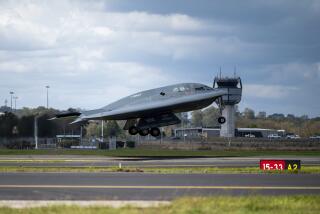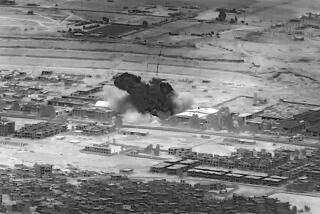In devising a plan in Iraq, U.S. looks to its Yemen model
- Share via
Reporting from Washington — As they plan their response to the crisis in Iraq, President Obama and his top aides are hoping to replicate elements of an often-overlooked and relatively successful U.S. military operation in another war-ravaged Middle East nation: Yemen.
An impoverished country on the southern end of the Arabian Peninsula, Yemen has played host to a powerful and ambitious network of Islamist militants linked to Al Qaeda. The United States has attacked it with an extensive counter-terrorism campaign that includes drone strikes by both the Pentagon and the CIA.
By most accounts, Al Qaeda in the Arabian Peninsula, which is considered the most sophisticated offshoot of the terrorist group founded by Osama Bin Laden and has targeted the United States several times, has been pushed back on its heels.
Obama cited Yemen as a model when he sketched out plans Thursday to send up to 300 military advisors to Iraq to help its struggling security forces beat back Sunni Muslim militants from an Al Qaeda splinter group who have overrun parts of the country.
The U.S. experience in Yemen has obvious appeal for a president who is loath to recommit major military resources to help Iraq less than three years after he withdrew all U.S. combat forces and ended America’s eight-year war there.
“Yemen so far has worked,” said Anthony Cordesman, a former intelligence director at the Pentagon now at the Center for Strategic and International Studies. “It’s not stable. It’s not clear what direction it is moving in, but the U.S. has exercised considerable influence there.”
Yet limits of the Yemen strategy are clear.
Despite an influx of military aid and nearly 100 drone strikes, plus about a dozen reported attacks with cruise missiles, since Obama took office, the U.S. effort has not eradicated the militant threat in Yemen, only contained it.
Political changes that might address the root causes of the unrest have been slow and uneven, despite a compliant and cooperative leader.
It is likely to prove more difficult in Iraq.
Though the Iraqi government has appealed for U.S. airstrikes, the Obama administration’s relations with Prime Minister Nouri Maliki are tense. The U.S. withdrew its troops in late 2011 after being unable to strike a deal with Maliki to leave approximately 10,000 in the country for training and counter-terrorism operations. Maliki, a Shiite Muslim, is widely accused of excluding Sunnis from power, alienating them and encouraging some to look to the insurgents.
The Sunni militants from the Islamic State of Iraq and Syria, known as ISIS, appear better armed and better led than the opposition fighters in Yemen. They now control a large stretch of Syria and Iraq, and have captured military equipment and hundreds of millions of dollars in cash and gold.
Obama has pushed Maliki to seek reconciliation with Sunnis and form a more inclusive government. The president has shown no appetite for using U.S. troops to win back the territory Maliki’s forces have lost to the insurgents.
He has cast the Yemen campaign as being more limited in scope. The overall effort has enabled the U.S. to “go after folks that might try to hit our embassy or might be trying to export terrorism into Europe or the United States,” Obama said.
Daniel Benjamin, a former State Department counter-terrorism coordinator now at Dartmouth College, described Yemen as a “basic template for how we do counter-terrorism” with partnerships around the world.
“But in the case of both Iraq and Syria, it’s going to be significantly more difficult than what we’re doing in Yemen,” Benjamin said.
In his comments, Obama said Washington has a “committed partner” in Yemeni President Abdu Rabu Mansour Hadi, who took office in February 2012 after Ali Abdullah Saleh, a far less accommodating partner, was ousted after 33 years in power.
Hadi has given Washington a relatively free hand to help his security forces go after militants who last year seized several southern cities before they were repelled.
U.S. military advisors work from joint operations centers, providing tactical guidance to Yemeni military commanders, just as Obama has proposed in Iraq. The U.S. has not put large numbers of troops in Yemen, his goal in Iraq as well.
Unlike the better-known drone war in Pakistan, where political leaders publicly condemn U.S. attacks, Hadi has said he personally approves each drone strike in Yemen.
Obama has touted the Yemeni approach before, and recently proposed that Congress create a $5-billion fund that would support similar targeted counter-terrorism operations in hot spots around the globe.
Steven Simon, one of Obama’s former Middle East advisors, described the approach as “intelligence-driven, dynamic targeting” that uses drone strikes to disrupt terrorist cells or kill their leaders.
“And within limits, it’s successful,” Simon said. “It makes sense to transplant that approach to Iraq” provided a political solution is also sought.
Efforts to pressure Hadi to form a more inclusive government have made little progress, while division between northern and southern tribes has exacerbated the country’s political instability.
But that tension doesn’t compare to the fierce sectarian battles between Sunnis and Shiites in Iraq. Maliki’s Shiite-led government has bred such distrust in the Sunni heartland north of Baghdad, U.S. experts say, that it will be hard to repair the situation.
Critics say the Yemen example is too limited for the challenge in Iraq. The ISIS militants in Iraq are so radical that Al Qaeda has disavowed them, and they now control so much territory that the country is fast becoming a destination for foreign fighters.
Nearly all the suicide bombings in Iraq — and there were almost 300 last year — were carried out by foreign fighters who had entered the country from Syria, Brett McGurk, the special U.S. envoy for Iraq and Iran, told the House Foreign Affairs Committee this year.
“This effort in Yemen is more focused on the leaders, and not necessarily helping the Yemenis defeat the insurgency,” said James Phillips, senior research fellow at the Heritage Foundation. “This approach in one sense is effective in containing and mitigating; it’s not effective in defeating.”
For now, the Obama administration is encouraging Iraq’s parliament to form an inclusive government, and U.S. diplomats are talking to some leaders who may seek to replace Maliki. They are not ruling out drone strikes or other military action in coming weeks.
“Insofar as the U.S. considers taking direct military action, I think that would be in a more targeted and focused way if we felt that there was a target on the ground that demanded our unique capabilities,” said a senior administration official who briefed reporters on condition he not be identified.
But Obama has expressed little faith in a quick resolution. His focus on counter-terrorism models may give a better sense of the long-term picture.
The U.S. goal isn’t to “play Whac-a-Mole whenever these terrorist organizations may pop up,” Obama said, but to build effective partnerships with governments to manage the threat.
kathleen.hennessey@latimes.com
Times staff writer Christi Parsons contributed to this report.
More to Read
Sign up for Essential California
The most important California stories and recommendations in your inbox every morning.
You may occasionally receive promotional content from the Los Angeles Times.













